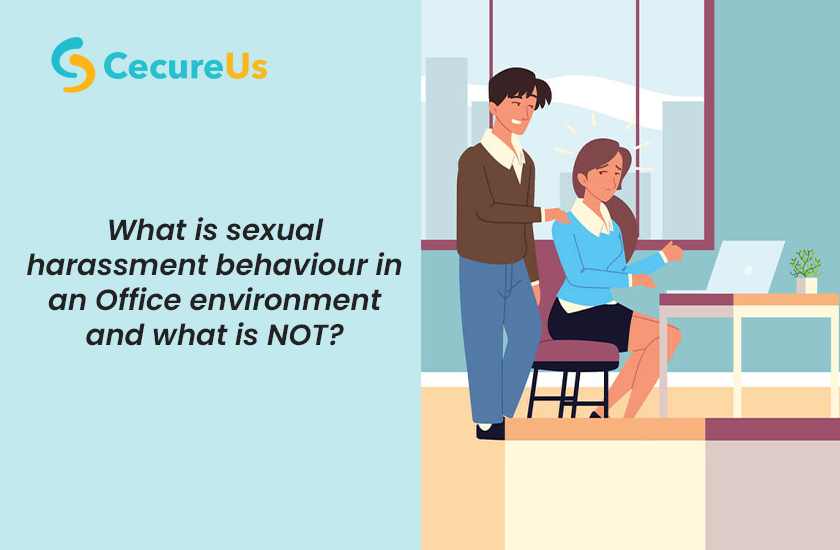
There is an essential difference between being friendly and making people uncomfortable. It’s common to have doubts about the intentions of an overly-friendly colleague. But there are clear indicators of what constitutes sexual harassment and what does not. A clear understanding of harassment behavior is vital for a healthy workplace environment.
More than 50% of India’s working population admits to having faced sexual harassment. However, most victims remain silent about their plight for fear of job loss and other consequences. Whether you’re the victim or a witness, it’s important to identify and report harassment cases.
Indicators of sexual harassment
Sexual harassment at a workplace generally constitutes unwelcomed and unsolicited behavior towards someone in a physical, non-verbal, or verbal manner. Repetitive uncomfortable events or even a single case, if severe enough, can be termed as sexual harassment.
Activities can range from inappropriate touching and lewd comments to looks and advances. Any unwelcome behavior that creates a hostile and unsafe environment constitutes sexual harassment. Unfortunately, victims are often unaware of subtle inappropriate behavior, which builds up to severe cases.
The workplace is a highly professional atmosphere, and people should have no reason to feel insecure and unsafe. Therefore, it’s crucial to understand and identify these clear indicators of sexual harassment behavior.
- Inappropriate and unnecessary physical contact and invasion of personal space. Brushing up against a person, intimate and lingering contact are unwarranted.
- Unsolicited and lewd comments on psychical appearance. Compliments that go beyond being friendly and make you uncomfortable.
- Quid Pro Quo demands. Including asking for a sexual favor in return for a promotion or any form of assistance.
- Consistent and forced flirting without any consent. Romantic advances should be discontinued when there is no retaliation.
What does not constitute sexual harassment?
Since the workplace involves genders co-existing in a closed environment, it becomes difficult to differentiate sexually inappropriate behavior from non-sexual advancements. Confusion is warranted as the lines can sometimes overlap. Many workplace officers, especially managers, often worry about freely interacting with the opposite gender without making them uncomfortable.
Here are some quick checks to know what does not fall under sexual harassment:
- Work-Related Questions. Communicating about work performance or meeting deadlines. Questions on the quality and volume of work are professional.
- Late-Night Emergency calls. Occasional and urgent late-night calls for work, project deadlines, and work-related news are not harassment.
- Professional or friendly handshakes used for greetings or meetings as part of a deal are common workplace ethics.
- There is a clear difference between sexual remarks and compliments. General, friendly compliments that do not go overboard are considered consensual.
- Questioning violation of code of conduct. Questions regarding violating the code of business conduct or disciplinary policies are part of the work environment.
- Well-intended constructive feedback directed toward the project and work results, and not the person, is welcomed and appropriate.
- Personal Questions. The workplace has the right to know relevant personal information about your address and contact information for your employment.
There’s a wide variety of ways for healthy interaction and communication with your colleagues and employees of the opposite gender. Comfortable, friendly, and professional interactions are far from being misinterpreted as sexual harassment.
For you to know: Litmus Test
As a manager or employee, there can be instances where you unintentionally make your colleague uncomfortable. People constantly live over the fear that they might offend someone when they have no wrong intentions.
There are practical ways to identify if a person feels sexually threatened or uncomfortable because of their behavior or certain activity. It’s vital to understand if you are unknowingly coming off as inappropriate.
This Litmus Test is a quick and straightforward method to note a person’s response to your behavior and identify if they feel unsafe. Ask yourself these questions to clarify if you’re violating a person’s private space.
- Watch for negative body language.
If they are visibly repulsive with their body language when conversing with you, they are feeling uncomfortable. Stepping back when you lean in to speak, crooked smiles at jokes and remarks are indicators of insecurities.
- Will I be okay if the same behavior is done to my family or me?
Look back and rethink your actions and comments. Imagine that the same thing was done to you or your family members. If the thought of this makes you uncomfortable or anxious, you have your answer.
- Will I behave the same in front of my children?
We’re at our best, most composed selves in front of our children. Ask yourself if you would behave in the same way in front of your children as you did at work.
- Is it okay if my action is reported to HR or Social Media?
Insecurity and anxiety about your actions being reported to the authorities are closely related to guilt. You would not be worried about reporting if you knew your behavior was not wrong. The reflective questions help assess if you’re unintentionally making your colleagues or employees sexually uncomfortable.
If this article interests you, leave a comment below or write to connect@cecureus.com. For more blogs and articles, visit our official website. Contact us for workshops and queries related to POSH, EAP (Employee Assistance Program,) and Diversity and Inclusion.




